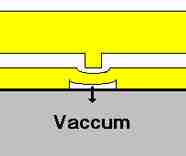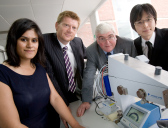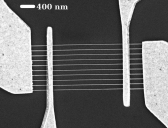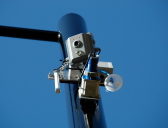The University of Washington has developed a photo-stitching algorithm that produced a 3D model of Rome in under a day, from 150,000 tourist photos. The tool is the most recent in a series developed at the university, and in this used photos tagged either Rome or Roma from Flickr.
University Electronics
The latest electronics news from UK universities
Electron-free microprocessor runs on air
The University of Michigan has used air and planar process fabrication to implement programmable control logic and memory with pneumatics. The air chip came out of a need to reduce the amount of macroscopic equipment surrounding microfluidic chips used in medical analysis.
Updated – Southampton developing blood cell analyser based on microfluidics
The University of Southampton is developing a blood cell analyser based on microfluidics and cell-by-cell impedance analysis. The fluid passages and electrodes are inside a stamp-sized glass-epoxy assembly that could one day be part of a hand-held analyser, replacing lab-based tests.
Murata and Manchester to work on mesocrystal materials
The result could be improved capacitors. "These materials are made of crystals that are separate, but all lined up," Manchester chemist Professor Paul O'Brien told Electronics Weekly. "Crystals in ceramic capacitors are similar, but random."
Southampton develops hand-held blood cell analysis device for GPs
A hand-held blood cell analysis device for doctors' surgeries is being developed by the University of Southampton.
Southampton University wins $25,000 Charles Babbage Grant
The University of Southampton has won Synopsys' £25,000 Charles Babbage Grant, the first university outside the US to do so. Also part of the Grant, the university's School of Electronics and Computer Science (ECS) will receive licenses of Synopsys' EDA software and intellectual property for two years.
Georgia Tech claims 100x copper conductivity for graphene interconnect
Georgia Tech is claiming 100MA/cm2 current densities for graphene interconnect. Graphene, a single layer of graphite molecules discovered at the University of Manchester, is being touted both for future on-chip interconnect and super-fast semiconductors.
Commercialising university research is focus of £10m initiative
The University of Surrey and the National Physical Laboratory (NPL) have signed an agreement to collaborate in a £10m programme to realise the full potential of research into areas such as signal processing and nanotechnology.
Cambridge University builds lamppost-mounted traffic-counting sensors
The sensor is part of a project called Transport Information Monitoring Environment (TIME) that is looking at ways to gather traffic information, then process it into formats that are useful to traffic managers and road planners.
Computing for the future of the planet
Professor Andy Hopper and Dr Andrew Rice of the University of Cambridge Computer Laboratory, examine the role of computing in the quest to reduce our impact on the environment and improve our lives.
 Electronics Weekly Electronics Design & Components Tech News
Electronics Weekly Electronics Design & Components Tech News




